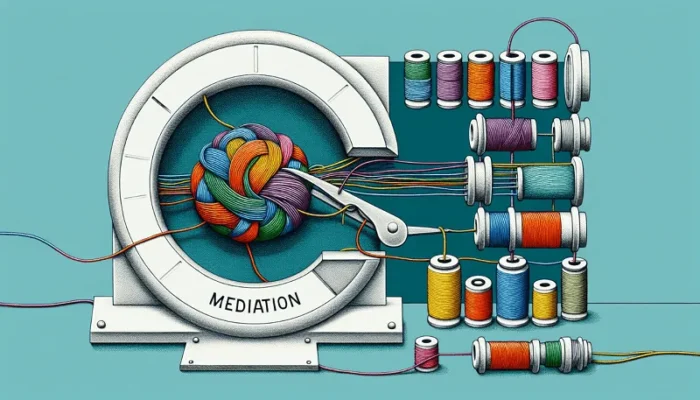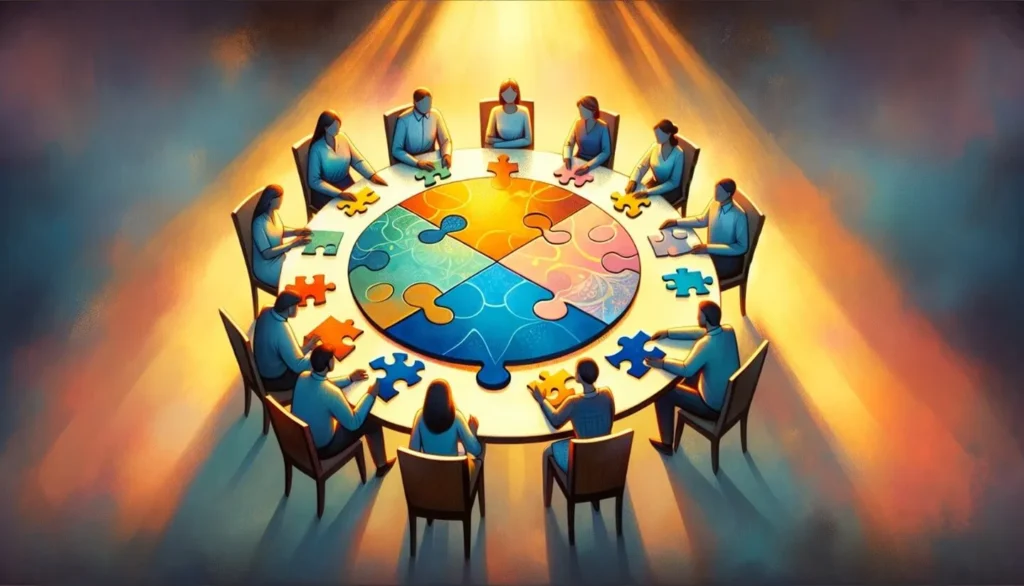
Why Choose Mediation?

Did you know mediation could be your secret weapon in solving conflicts? This approach isn’t just about getting past disagreements; it’s about doing it in a way that’s quicker, costs less, and feels more personal.
By talking things through and working together, you can produce solutions that really fit your needs. Plus, it often helps keep important relationships strong.
This article explores these advantages, showing how mediation puts the power back in your hands.

It’s not just about finding any solution—it’s about discovering the best one for you and the people involved.
Curious to see how it works? Dive in to learn how mediation can be a smarter, kinder way to clear up conflicts.
Key Takeaways
- Mediation offers a flexible, less adversarial, and faster alternative to traditional litigation, accommodating personal schedules and promoting direct communication for mutual understanding.
- The process of mediation is cost-effective, reduces time and emotional stress associated with resolving disputes, and often results in higher satisfaction due to its collaborative nature.
- Mediation ensures privacy and confidentiality, empowers parties to have control over the outcome, and invites creative problem-solving that can prevent future conflicts.
Streamlining the Resolution Process
In our fast-moving society, speed and efficiency are paramount—qualities that are critical in the realm of dispute resolution as well.
Imagine a mechanism so adaptable it accommodates your time constraints, promotes unfettered communication so effectively that parties can speak openly, and operates with such alacrity that disputes are settled much quicker than conventional legal methods allow.
Mediation embodies this ideal—it is an alternative dispute resolution process gaining momentum globally for its efficacy in resolving conflicts swiftly.
Flexibility in Scheduling
One of the key advantages of mediation over litigation is its adaptable nature and the benefits this process offers.
Mediation sessions are not confined to strict court schedules, thus enabling parties to:
- Arrange meetings at times that suit everyone involved
- Plan discussions for when all participants can be fully present and participate without being pressured by time constraints
- Foster a setting that enhances comfort levels and is more favorable for reaching a resolution
Direct Communication
Mediation directly tackles miscommunication or misunderstanding at the core of every dispute.
It facilitates open dialogue with the help of a mediator, enabling parties to perceive the conflict through each other’s viewpoint, which promotes empathy and aids in resolving.
This enhanced comprehension typically results in a resolution that is beneficial for all involved, maintaining relationships and securing lasting contentment.
Speedier Outcomes
Mediation honors the value of time by providing a swifter alternative to extended court proceedings for dispute resolution.
Sessions can be swiftly scheduled and typically, mediation may resolve the issue within just one meeting.
This not only conserves time but also facilitates a more expedited resolution compared to prolonged investigations, affording you the tranquility that comes with swift conflict settlement.
Minimizing Costs, Maximizing Satisfaction

In the sphere of dispute resolution, minimizing expenses while enhancing satisfaction is paramount.
Enter mediation – a tailored process aimed at reducing your financial burden and guaranteeing that your perspective is acknowledged and valued.
Lower Financial Burden
Mediation serves as a cost-effective option compared to the potentially exorbitant expenses associated with litigation.
It presents an economical alternative by circumventing lengthy court proceedings, thus keeping costs in check.
The process of mediation results in considerably lower average costs for each party when contrasted with even basic litigation cases, thereby offering a distinct financial benefit.
Emotional and Time Savings
The expenses related to the resolution process aren’t solely monetary. Considerations for time and emotional strain must be taken into account, which is a significant advantage of mediation over traditional litigation. Mediation offers a more amicable approach that mitigates stress and emotional burden.
Typically, disputes are settled within one to three meetings, with each session running approximately four hours, thereby accelerating the process, and diminishing the costs associated with mediation.
Because parties work together towards finding solutions in mediation rather than engaging in adversarial conflict as seen in litigation, there tends to be greater contentment with outcomes achieved through this collaborative dispute-resolution method.
Ensuring Privacy and Confidentiality

In today’s digital era, privacy and confidentiality are of utmost importance.
The mediation process meets these requirements by offering a secure and neutral environment that ensures discussions remain private through its confidential setting.
This allows for candid conversation without concern about information being divulged due to the nature of the confidential process.
Private Discussions
In an age where privacy is often compromised, the secrecy afforded by mediation offers a welcome respite. This confidential process of resolution ensures that:
- Conversations can be frank and direct
- Information divulged during these discussions remains protected from court use
- A sense of trust is cultivated among parties
- Openness in communication is promoted
These critical components are instrumental in successfully resolving disputes.
Protection of Interests
Mediation not only protects your privacy but also defends your interests. The state of Florida requires that the process of mediation remain confidential, thus securing personal information and business secrets from the outset.
Agreements reached through mediation can be tailored to preserve confidentiality, providing an extra level of security for your interests.
Empowering Parties with Control

The benefits of mediation extend to granting parties involved equal participation in steering the outcome, which is one of its most advantageous features.
By participating in mediation, you retain the decision-making authority rather than surrendering it to a judge or jury, ensuring that all parties have an equitable voice in crafting resolutions tailored to their specific circumstances.
Equal Say in the Outcome
Under the conventional litigation process, a judge or jury decides the resolution of the dispute.
Contrastingly, mediation gives each involved party an equal chance to shape and negotiate what that outcome will be.
This equitable approach ensures that every participant’s viewpoint is recognized and considered within a fair and collaborative setting.
This equitable structure often leads to greater contentment with the final resolution of the conflict because all parties have had an opportunity to contribute equally to reaching it.
Crafting Own Solutions
The process of mediation extends beyond simply resolving disputes. It is aimed at developing resolutions that are suitable for all participating parties.
It enables the individuals involved to negotiate directly and arrive at a settlement that reflects collective consensus rather than assigning blame.
In this context, mediators play a crucial role in guiding the parties towards agreements that they can both endorse.
These professionals facilitate the drafting of these consensuses into documents which subsequently gain recognition as legally binding contracts.
The Role of the Neutral Third Party
The success of the mediation process is heavily dependent on the mediator’s role. Acting as a neutral third party, they are instrumental in guiding parties through communication and steering them toward a resolution.
Facilitating Communication
Acting as a key facilitator, the mediator significantly enhances communication among parties in disagreement.
They aid these parties in articulating their positions and recommend different approaches to communication when conversations come to a standstill.
By playing this pivotal role, the mediator fosters trust while guaranteeing that the views of each party are recognized and comprehended during discussions.
Guiding Towards Resolution
It is essential to recognize that the mediator’s responsibilities extend beyond just aiding in communication. They are not always the ones mediating each scenario.
They steer and shape the negotiation process with the end goal of crafting a consensual settlement among involved parties.
Mediators play a pivotal role by ensuring everyone’s viewpoints are acknowledged and comprehended, thus bringing transparency to discussions.
This clarity provided by mediators facilitates reaching an agreement that all parties can accept as a resolution.
Creative Problem-Solving Approach

Mediation stands out for its inventive approach to problem-solving. Not only does this process successfully settle the immediate dispute, but it also fosters novel solutions that help avert subsequent disagreements.
Beyond Legal Boundaries
Mediation transcends the confines of legal parameters, augmenting opportunities for parties to better their relationships through cooperative engagement.
It facilitates a platform for candid discussion about interests that go beyond legal limits, which encourages all-encompassing solutions that incorporate elements not restricted to law.
Future Conflict Prevention
Mediation not only resolves the current conflict but also sets the stage for collaborative resolution of future issues.
The agreements reached through mediation commonly include provisions that preemptively tackle prospective disputes, fostering enduring harmony among the involved parties.
Mediation vs Litigation: A Comparative Overview
It’s crucial to bear in mind that each conflict is distinct. As such, when considering mediation and its myriad advantages, one should also evaluate litigation to ascertain which method best fits the particularities of your dispute.
When Mediation is the Better Option
In cases of disputes, especially those involving family law issues like divorce and child custody, mediation is usually more advantageous when it’s important to maintain personal relationships.
Unlike litigation, which fosters a win/lose scenario that can strain ties between individuals, the cooperative approach of mediation helps in sustaining valuable connections.
Considering the Nature of the Dispute
Determining the most suitable approach to resolving your dispute greatly depends on its inherent complexities.
Particularly in disputes that entail intricate financial details, a thorough examination is often necessary.
Conversely, when facing high-tension conflicts, litigation might be preferable as it employs a structured legal process including discovery and culminates with an objective ruling enforced by either a judge or jury.
Summary
Mediation is changing the way we solve problems by making the process faster, cheaper, and private. It puts you in charge of the outcome, helps everyone talk openly, and lets you come up with unique solutions. Whether it’s a family issue or a business problem, mediation can offer a new perspective.
We’ve seen how mediation can save time and money, keep things confidential, and help everyone feel empowered. Think about how these benefits could apply to situations in your own life.
Are you ready to try a different approach to resolving disputes? How might mediation help you see things differently?
Share your thoughts or explore more about how mediation works. Join the conversation and discover new ways to move forward!
Find Resolution, Not Roadblocks: Choose Mediation
Disputes can overshadow your life, consuming time, energy, and money. With Peacemaker Mediation Group, you have the opportunity to resolve conflicts through mediation—a path to peace that keeps you out of the courtroom.
Our services span divorce, child custody, and property disputes, emphasizing a process that’s not just about finding common ground but about respecting your personal needs and outcomes.
Why let a dispute disrupt your life more than it has to? Our mediators are ready to help you close this chapter with dignity and mutual respect. Connect with us today and step towards a resolution that respects your terms and conditions.
Frequently Asked Questions
What makes mediation more efficient than litigation?
Mediation offers a swifter dispute resolution process compared to litigation, as it fosters open communication and flexibility among parties involved.
How does mediation save costs?
By averting extended litigation, mediation serves as a cost-effective alternative that yields significant economic benefits for all parties involved, ensuring they avoid incurring high expenses from protracted court battles.
Is mediation confidential?
Mediation ensures confidentiality, permitting the frank exchange of delicate matters during discussions.
Do parties have control in mediation?
Indeed, within the mediation process, parties retain authority over crafting resolutions and steering the decision-making process.
How does mediation encourage creative problem-solving?
Mediation fosters inventive resolution strategies by facilitating collaborative and productive idea generation, as well as examining a range of potential solutions.

